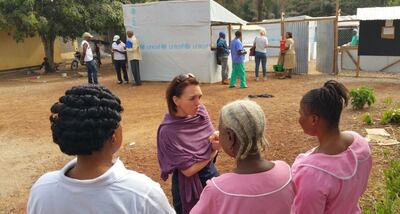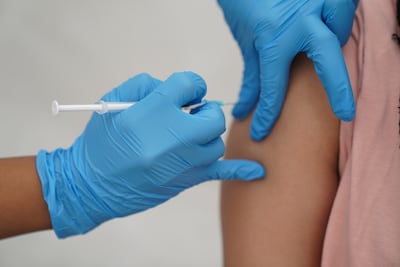The deadly Marburg virus emerged in Tanzania and Equatorial Guinea this year and, while both outbreaks are over, the risk of further flare-ups remains.
Efforts are being made to develop a vaccine against the disease, which is notable for its high fatality ratio: three-quarters of the people in Tanzania with the disease died.
Having a vaccine would be "extremely important", according to Dr Daniela Manno, an assistant professor at the London School of Hygiene and Tropical Medicine.
"There are many things you can do," she said. "You can protect healthcare workers or frontline workers deployed in outbreak areas. Especially in tropical conditions, wearing full protective equipment is quite hard."
As well as safeguarding workers who are at the highest risk, a vaccine could be deployed in a "ring vaccination" approach, in which contacts of infected individuals, and people in close contact with these contacts, are immunised.
Mass vaccination would not be undertaken because the virus is not in widespread circulation and outbreaks tend to be sporadic.
"It would be something you would roll out very rapidly if and when someone did become infected," Ian Jones, professor of virology at the UK's University of Reading, said.

How does it impact the body?
People with Marbug suffer haemorrhagic fever, which involves bleeding that can, according to the US Centre for Disease Control, damage many of the body’s organ systems. The closely related Ebola virus also causes the fever.
The first recognised cases emerged in Europe 55 years ago as a result of infections linked to laboratories that held green monkeys brought in from Uganda.
Egyptian fruit bats can carry the virus and while they do not fall ill, they can pass the pathogen on to people, and cases have originated in caves and mines where the bats live.
The World Health Organisation reports that the virus passes from person to person if blood or other bodily fluids of an infected individual are in contact with another person’s mucous membranes (such as the lining of the mouth) or broken skin.
While deadly, outbreaks tend to be limited in scale because each person with the disease typically only infects one or two others, and there is a long time lag between cases.
However, in certain situations, such as when there has been conflict and health infrastructure is poor, outbreaks can be difficult to control and may, as has been the case in countries such as the Democratic Republic of Congo and Angola, last for months or years.
The race for a vaccine
A handful of vaccines against Marburg have entered trials, all viral vector vaccines similar to the Oxford-AstraZeneca vaccine used against Covid-19.
These jabs use a harmless virus to deliver genetic material into recipients’ cells, where the genetic material codes for the production of glycoproteins (proteins with carbohydrates attached) like those in the Marburg virus. The immune response to these should be protective in the event of infection.

Testing Marburg vaccines is complicated by the fact that the virus is not in wide circulation.
Normally in a clinical trial, one group is given a vaccine and scientists look at whether these people are less likely to fall ill than members of another group left unvaccinated.
With Marburg, it would be unlikely that any recipients of either group would be exposed to the virus naturally and infecting people deliberately is not allowed.
Vaccine candidates can, however, be tested on people for their safety and to look at the immune response.
Dr Manno, who has carried out extensive research in Africa related to vaccination programmes for Ebola, was recently asked by The Lancet medical journal to comment on an article presenting the results of a trial of one of the Marburg vaccines. While this trial involved only 40 people, Dr Manno said the results were promising.
"I thought the vaccine had very good safety and immunogenicity," she said.
Vaccines have also been tested on primates, with some deliberately infected in "challenge" studies to determine if the jab offers protection.
By comparing the immune response in primates to the immune response in people, and then considering the results of challenge studies, scientists can decide if a vaccine is likely to protect people.
"You have to ask if the animal models are a good mimic of the situation in people," Prof Jones said.
"Sometimes the animal will not show the same disease because the virus doesn’t disseminate the same way in people. There’s a certain leap of faith to know the animal data will accurately translate to people."
When it was not possible to demonstrate protection in people, organisations such as the Food and Drug Administration in the US and the EU’s European Medicines Agency have been willing, Dr Manno said, to license vaccines on the basis of studies on human and animal immunogenicity and animal efficacy.
Even if vaccines are not licensed, she is confident that the emergency use of a vaccine would be considered in the event of another Marburg outbreak.
Vaccination programmes in parts of sub-Saharan Africa do, however, face practical challenges because of poor infrastructure and vaccine hesitancy, as highlighted in a paper published in the journal Diseases this year.
"Vaccine hesitancy occurs against a colonial backdrop of inequities in global health research, social-cultural complexities, poor community involvement and public distrust," the study's authors wrote.
"All of these factors undermine the confidence that is crucial for sustaining collective immunity in vaccine programmes."
Also, as Dr Manno put it, vaccination is "not a magic bullet" and is just one of multiple interventions needed to prevent the spread of outbreaks.
Other measures include early identification of cases and contact tracing, although this can be challenging in the regions affected by outbreaks. Community awareness of the disease and safe burials are also important.
"We’ve known for years that you can contain outbreaks in this way," Dr Manno said. "If they’re implemented properly, they work. With these diseases, any community engagement is very important."
Ensuring burials are safe is vital because traditional practices that involve cleaning and washing bodies can spread diseases such as Marburg or Ebola.
There are many hurdles to ensuring that everything is done to prevent diseases from spreading, including asking people to agree that relatives who are ill can be taken away to be treated.
"These diseases that affect close contacts and are often fatal are very tough," Dr Manno said. "It’s not easy. It could be your parents, your children, your partner.
"You need to call someone who comes to your house and takes them away and maybe that’s the last time you see them alive.
"It’s difficult to explain messaging on the risk of transmission in this kind of tragic situation and ensure outbreak control measures are followed."





